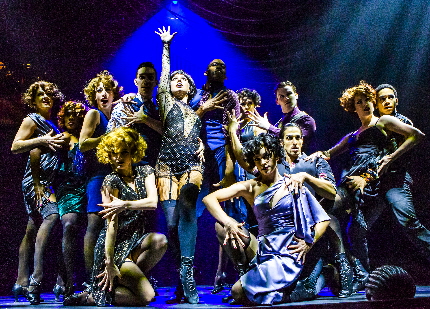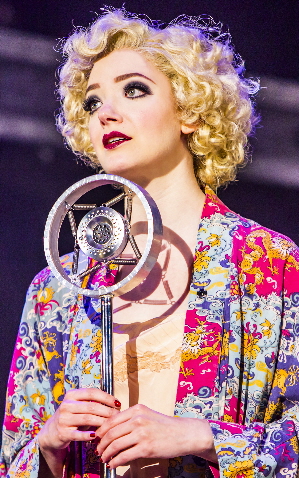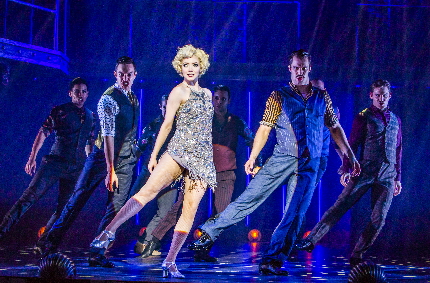
Sarah Bowden and friends offer a prim, restrained, low-key welcome to Chicago at the Maltz Jupiter Theatre / Photos by Jason Nuttle
By Bill Hirschman
When hearing that the Maltz Jupiter Theater is presenting Chicago, potential audiences could be forgiven for thinking silently: “Chicago? Again? Seen it two or five times already.”
They could not be more wrong. For years, the Maltz has specialized in taking a popular title, one most of its audiences have seen multiple times, and reimagining it so completely — without deconstructing it — that it’s as if you’ve not seen it before.
So it is with this current run of Chicago which sadly for you is completely sold out and unable to extend.
From the opening notes of the wailing trumpet in the overture, from the first actors in theatrically heightened period costumes wandering on, from the first song, director/choreographer Denis Jones and his troupe let you know that this is not a replica of any Chicago you may have seen. And as good as earlier versions are, that is a welcome note for many who have seen this show a couple of times too many.
There is hardly a shred of Bob Fosse’s iconic choreography or Walter Bobbie’s minimalist staging of the still running 1996 revival, not an echo of any of the A-list names who starred in the 1975 original, the ’96 revival or the 2002 Academy Award-winning film.
It is not that Jones & Co. have turned the material and the themes inside out; indeed, the resonances to the modern day zeitgeist and the most current events possible are too recognizable to allow an audience to dismiss it all as simply irrelevant entertainment.
But Jones and his team have treated this almost like a new script that has come in the mail and given it fresh but faithful vision.
Yes, it’s consistent with every version dating back to the original 1926 play: Cynicism — about human nature, cupidity, gullibility, greed, publicity, show business and the sensationalism-driven media — drips from every line of lyric and dialogue that Fred Ebb wrote with ’96 bookwriter David Thompson. John Kander’s score so perfectly delivered here by musical director Eric Alsford and breathtaking band joyfully mocks and comments with the snarky slide of the trombone and the laugh of the muted trumpet.
For merry murderesses Velma Kelly and Roxie Hart, their lawyer Billy Flynn and jail matron Momma Morton, cynicism is a religion that they rationalize as pragmatism; therefore, their jettisoning of truth should ring more bells in 2020 than a church carillon. None of them are ashamed of their naked greed and unalloyed self-interest, let alone their methods. If they cared enough, and they don’t, you might think they were trying to proselytize the audience they address throughout.
The persistent mystery is why we embrace these unvarnished opportunists — if we don’t quite root for them, they don’t repel us. Perhaps the show gives us a window to vicariously savor the freedom of indulging our baser instincts while laughing at and applauding “just” a Broadway show.
Jones, fresh from choreographing Tootsie on Broadway, also directed and choreographed the show at St. Louis’ Muny in 2012, plus he was one of the original swings in the revival and returned to it repeatedly between other gigs.
Despite that intimate familiarity with the revival, he has come up with an unique imaginative staging. Since the show is sold out, we can reveal some examples. For instance, when Roxie is singing “Funny Honey” after shooting her husband, two coroners enter with a stretcher to remove the body. Instead, they allow Roxie to lie on it like Cleopatra on a litter and carry her lounging body as she sings her vampy number. Also, when Amos sings “Mr. Cellophane,” he slowly strips off his bleak clothes to reveal garish clownish clothing that intentionally amps up how unnoticeable Amos is. Jones’ glorious choreography is sui generis with arched backs, fluid loose-limbed action and a real penchant for high, high kicks at every opportunity.
Key, of course, is the casting. While the majority of the performers needed a travel voucher to find Florida, you cannot quibble a jot about the quality of every last member of this troupe from the leads to the ensemble.
Sarah Bowden’s fierce expressive face, innate charisma, shining blue eyes and smoky clarion voice make Velma a compelling creature who long ago, perhaps always, saw the world as a rigged deck in which anything and everything is justifiable if it benefits you. Yet she convincingly charts the weakening of Velma’s seeming rock-hard confidence as Roxie’s fortunes soar, especially in the growing anxiety powering her outreach to Roxie, “I Can’t Do It Alone.”

Samantha Sturm
Samantha Sturm’s Roxie is intentionally never the helpless kewpie doll that some actresses have used as their starting point. She’s just unversed in navigating the system. The lithe Sturm makes Roxie’s goal and need clear in song and after song: she wants the affirmation of her self-worth to come from the applause and attention of others, no matter how fickle, ephemeral and shallow it might be.
Both actresses make their characters’ pragmatists not villainesses; This is what the world is and only a fool would play by any other rules. If exploiting their sexuality and the public’s gullibility will get them there, so be it.
Their equal is Nicholas Dromard’s smartly-dressed, sharp-talking attorney with a pencil thin moustache and a black hole where morals and ethics usually reside. His version is not quite as smarmy as some predecessors, but just as much an opportunist. Dromard has the requisite 30s radio crooner’s mellow voice to caress his seductions of the media and the jurors.
Also giving strong support is Altamiece Carolyn Cooper (who nearly stopped Hairspray at the Maltz with her numbers as Motormouth Maybelle) as Mama Morton, and Blakely Slaybaugh as the hapless Amos.
The 14-member ensemble, most of whom also have tertiary parts, is flawless as is the nine-piece full-throated band.
Another star of the production is costume designer Andrea Hood who produces closetful arrays of boudoir-worthy lingerie, fishnet stockings, garter belts, bowlers, vests and her own Victoria-Secret-meets-leather-bar outfits that do not imitate William Ivey Long’s work in the revival.
Set designer Adam Koch has created a marvelous meld of a bare vaudeville stage somehow fused with the interior of the prison, and late in the show features a full-stage neon American flag. But it’s Cory Pattak’s lighting that is essential to setting moods and creating different acting environments on what occurs on a bare stage with chairs and few roll-on set pieces. Wig designer Jon Jordan must have worked overtime including Velma’s bob-and-bangs helmet and Roxie’s tight blonde curls. And as always, Marty Mets’ sound design is textbook perfect.
Nothing is more sardonic, prophetic and downright meta than the finale written 45 years ago in which the lyric bemoans about how good things are “nowadays” with its enthusiastic endorsement of licentiousness and larceny. “But nothing stays / In fifty years or so / It’s gonna change, you know.”
Chicago runs through Feb. 2 at the Maltz Jupiter Theatre, 1001 E. Indiantown Road, Jupiter. Show times are 7:30 p.m. Tuesday to Friday, 2 p.m. Wednesday, 2 and 8 p.m. Saturday, and 2 p.m. Sunday. Running time 2 ½ hours with one intermission. Producing Artistic Director Andrew Kato swears there are no tickets available at all.








 A PaperStreet Web Design
A PaperStreet Web Design

2 Responses to Maltz Delivers A Fresh Riff On All That Jazz In ‘Chicago’